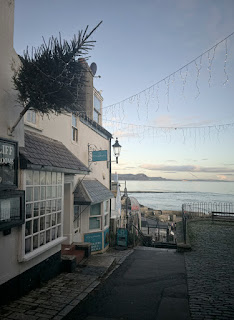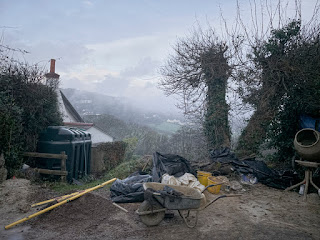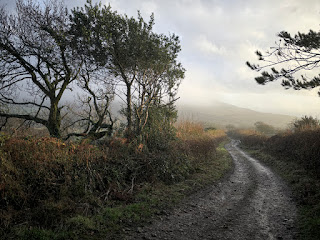Somewhere near Morcombelake...
The day before leaving for our Christmas family get-together in Dorset, just over a week ago now, I took our Renault Scenic into our usual friendly local garage for a service. We've had that car for something like 15 years, now. It was a couple of years old when we bought it, a top of the range "Fidji" model, with the unusual 1.8 litre engine, double sun roof, air con, the works: a perfect family vehicle for hot summer trips into France, say, loaded up with all the necessary and even a fair amount of unnecessary gear. It has served us well, although an encounter with an unexpectedly deep puddle a few Christmases ago did give us a problem with water in the spark plugs (thankfully sorted out by Scenic-lover Robin Wilson's garage in Axminster), and it's been clear for a while that, like us, it's beginning to feel its age.
So it was less of a surprise than it might have been to hear the list of problems the garage had discovered while carrying out the service. Not least an exposed and worn bearing in the clutch, which, in their words, might carry on for 10,000 miles or a mere 10 before giving out; it was hard to predict. What would happen if it did "go"? Well, we'd simply glide to a halt, as if running out of fuel. Which, if you've ever driven on one of our stupid, ridiculous, moronic "smart" motorways, where the hard shoulder has been converted into a fourth traffic lane for thundering trucks, is not a prospect to contemplate with any equanimity. So, after a last minute rethink, we decided to load up our little Skoda Citigo instead, which, despite its 1 litre three-cylinder (!) engine, is something of a pocket rocket.
Obviously, without the Scenic's bottomless storage capacity, this also meant a rethink of what we could take with us, and what we would have to leave behind. With the result that, for the first time ever, I travelled without any photographic gear at all, apart from my phone. I know... Scary.
However, as I trust the few samples here will testify, I needn't have worried overmuch. The iPhone 12 mini is a pocket rocket in its own right even if, like the Skoda, it is challenged by the photographic equivalent of a very steep hill. I am increasingly persuaded by the sheer convenience and versatility of a camera that also receives phone calls and texts, not to mention paying for car parking, or telling me exactly where I am and which way I'm facing. Which last, on a foggy day in deepest Dorset, is pretty handy, and a definite plus over any "real" camera I've ever used.
Golden Cap
Pickaxe Cross
After we had arrived at our destination – Morcombelake, midway between Bridport and Lyme Regis – and made a few trips to gather provisions and Christmas necessities (a 3 kilo free-range duck, for example), I knew we'd be needing more petrol before everything shut down for the holiday. So I got in the Skoda, started up, and checked the fuel gauge. Which, to my consternation, read "full": impossible, as we'd already driven nearly 150 miles. Which meant it must be faulty, which meant I would never have any idea of how much fuel was actually left. Fuck. The only answer was to head to the nearest garage and fill the tank up to the brim, and hope for the best.
Which I did. But I had barely managed to squeeze a few cupfuls into the tank before the pump shut off the supply. It seemed the tank was still full! And remains so even now after we've driven home, which is taking "fuel efficiency" to a whole new level. Incredible, really; the engine must run on petrol fumes alone. So, well done, little Skoda! And well done, little iPhone, too!
At the other extreme of efficiency, I got to watch Peter Jackson's marathon three-part, six-hours-plus re-edit of the material filmed during the sessions that led up to the famous "concert on the roof" by the Beatles, and ultimately the less-than-satisfactory Let It Be album. Our daughter has a Disney Plus subscription, and our Christmas hangout is well-equipped with TV screens, so the Prof and I were able to retreat to our bedroom and watch it there, John and Yoko style (minus the bag).
Now, although I was quite enthusiastic about the Beatles in my early teenage years, I was well over that enthusiasm by the time of Abbey Road and Let It Be in 1969/70. As, on the evidence of The Beatles: Let It Be, were the Fab Four themselves. Frankly, Jackson's film is like watching a simmering family row spread over an entire month (appropriate Christmas viewing, some might say). Someone characterised the mood of the rehearsal sessions as "hostile lethargy", which is spot on. It's not exactly fun to watch, although if you've ever been curious about what the Beatles were really like as, you know, real people, then it is fascinating. But the hype about revealing a less negative view of the period leading up to the final explosive and litigious Beatlegeddon is, well, hype. Jackson's trailer has extracted pretty much all the positivity to be found in hundreds of hours of footage; the rest is about as upbeat as a documentary about Dutch Elm disease.
What makes it almost worth the slog are the moments when they do re-discover the joy of playing together – the rooftop gig is always a treat – but above all it is fascinating to observe the creative processes of genius at work, for example how a song like "Get Back" emerges gradually out of McCartney's improvisation until it is suddenly there, like some ectoplasmic entity squeezing out of a spirit medium: it's uncanny to watch. I think my favourite moment, though, is when Lennon and McCartney sing "Two Of Us" at each other through clenched teeth, like duelling ventriloquists: it's hilarious, and something of the enduring depth of their friendship and the magic of their songwriting partnership still manages to shine through the boredom and barely-concealed impatience and hostility.
To be honest, I recommend watching Part 3 alone: you miss nothing much by ignoring the preceding two parts unless you are, say, a professional student of conflict resolution, or a fan of lengthy, unproductive meetings. In fact, why not just watch the various trailers on YouTube? Then you need never discover, at length and in depth, that Paul is a needy, manipulative control-freak and John an utter ████, joined at the hip to his freaky new girlfriend. The other two? They're just sulky bit-part spectators, acutely aware that – no matter what anyone says to the contrary – they are eminently replaceable as musicians. At one point George Harrison famously storms out, and they casually discuss replacing him with, oh, maybe Eric Clapton? Ringo, wisely, says and does nothing to rock the boat, other than look terminally bored as he endures slow death by paradiddle. There, I've saved you at least five hours of unnecessary viewing, and a large measure of disillusion... You're welcome!

Huh? I thought you died alone, a long, long time ago?
(Bridport hair salon)

















